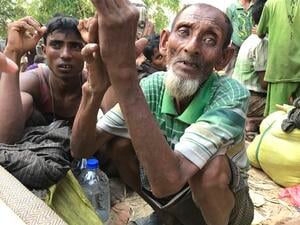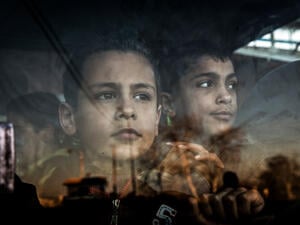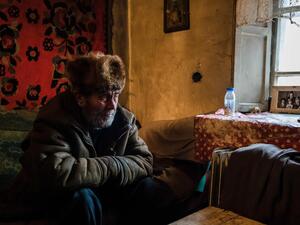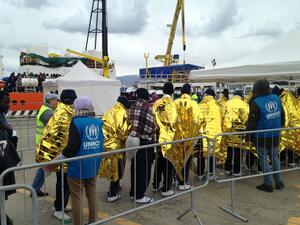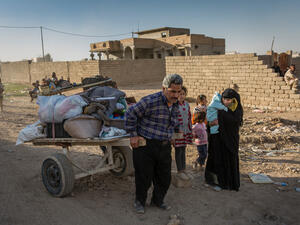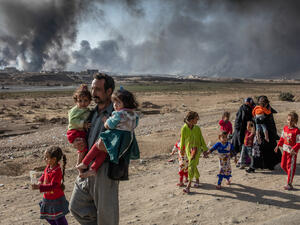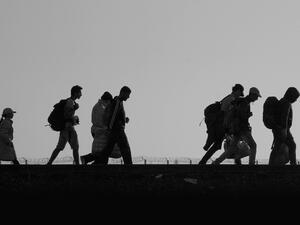UNHCR chief says 2009 "worst" year for voluntary repatriation in two decades
UNHCR chief says 2009 "worst" year for voluntary repatriation in two decades
2009 Global Trends Report
Geneva, Tuesday 15 June 2010
Some 43.3 million people were forcibly displaced worldwide at the end of 2009, the highest number of people uprooted by conflict and persecution since the mid-1990s, according to UNHCR's annual 2009 Global Trends report, released today. At the same time, the number of refugees voluntarily returning to their home countries has fallen to its lowest level in twenty years.
The report indicates that overall refugee numbers remained relatively stable at 15.2 million, two thirds of whom come under UNHCR's mandate while the other third fall under the responsibility of the UN Relief and Works Agency for Palestine Refugees. Because of the growing resilience of conflict, more than half of the refugees under UNHCR's care are in protracted situations.
"Major conflicts such as those in Afghanistan, Somalia and the Democratic Republic of Congo show no signs of being resolved," said UN High Commissioner for Refugees António Guterres. "Conflicts that had appeared to be ending or were on the way to being resolved, such as in southern Sudan or in Iraq, are stagnating. As a result last year was not a good year for voluntary repatriation. In fact, it was the worst in twenty years."
UNHCR's report shows that only 251,000 refugees went home in 2009, the lowest since 1990. This compares to a norm over the past decade of around a million people repatriating each year.
"Already a majority of the world's refugees have been living as refugees for five years or more. Inevitably, that proportion will grow - if fewer refugees are able to go home," Guterres added, referring to the over 5.5 million refugees under UNHCR's mandate in a protracted situation.
The number of people uprooted by conflict within their own country grew by four percent, to 27.1 million at the end of 2009. Persistent conflict in the Democratic Republic of Congo, Pakistan and Somalia mainly accounted for the increase in the overall figure.
The new report also notes that more and more refugees are living in cities, primarily in the developing world, contrary to the notion that refugees are inundating industrialized nations.
The number of new individual asylum claims worldwide grew to nearly one million, with South Africa receiving more than 222,000 new claims last year, making it the single largest asylum destination in the world.
The annual 2009 Global Trends report, which reviews statistical trends and patterns of conflict-related displacements, also covers stateless persons. The number of people known to be stateless at the end of 2009 was 6.6 million though unofficial estimates range as high as 12 million.
UNHCR protects, assists, and seeks solutions for refugees. The persistence of conflict makes voluntary return to countries of origin, the solution preferred by host countries and refugees alike, more difficult.
With resettlement - through which refugees hosted in one asylum state, usually in the developing world, are permanently relocated to another state, usually in the developed world - UNHCR submitted a record 128,000 individuals for resettlement in third countries, the highest level in 16 years.
At the end of 2009, 112,400 refugees were admitted for resettlement by 19 countries, including the United States of America (79,900), Canada (12,500), Australia (11,100), Germany (2,100), Sweden (1,900), and Norway (1,400).
The main refugee groups resettled in 2009 were from Myanmar (24,800), Iraq (23,000), Bhutan (17,500), Somalia (5,500), Eritrea (2,500), and the Democratic Republic of the Congo (2,500).
Over the last decade, at least 1.3 million refugees have been naturalized - more than half of them in the United States.
Terms used in this press release
- The terms Refugees and Asylum Seekers apply to people who flee across international borders.
- A Refugee is a person who owing to a well-founded fear of being persecuted for reasons of race, religion, nationality, membership of a particular social groups or political opinion, is outside the country of his or her nationality and is unable or, owing to such fear, is unwilling to avail himself or herself to the protection of that country. In addition, UNHCR's mandate is extended to any person who is outside his or her country of origin and unable to return there owing to serious and indiscriminate threats to life, physical integrity or freedom resulting from generalized violence or events seriously disturbing public order.
- An Internally Displaced Person is an individual who has been forced or obliged to flee from their home or place of habitual residence but who has not crossed an internationally recognized state border.
- An Asylum Seeker is an individual who is seeking international protection.
- Stateless people are persons who are not considered as nationals by any state under the operation of its law, including persons whose nationality is not established.
- UNHCR is the abbreviated form of United Nations High Commissioner for Refugees.
Read the report
- 2009 Global Trends: Refugees, Asylum-seekers, Returnees, Internally Displaced and Stateless Persons, 15 June 2010.


